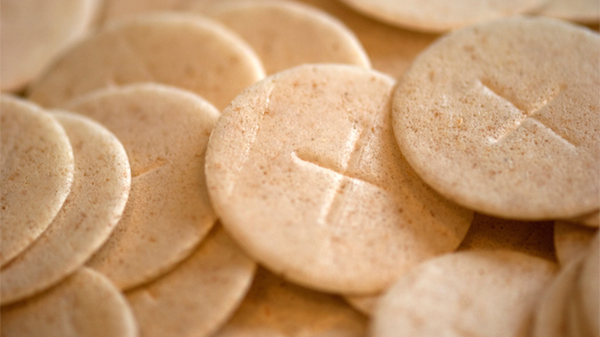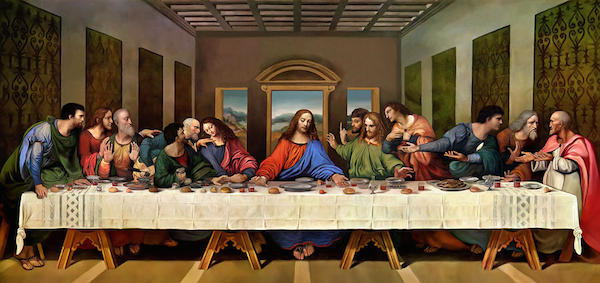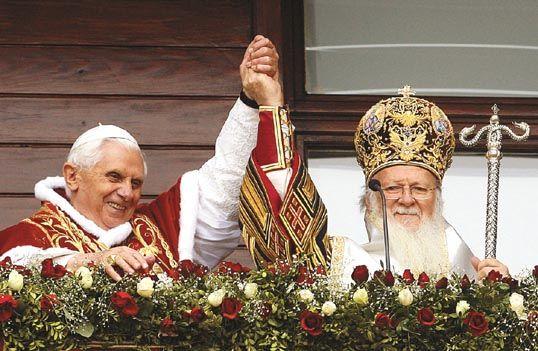Non-Catholics receiving Communion? Part 2
In my previous post, I recounted a little bit of my own story and how I came to reconsider the Catholic teaching concerning intercommunion. In today’s post I would like to present the two main issues around which this teaching revolves.

Issue #1: What are you receiving? Or rather, whom?
As I see it, there are two main issues concerning the reception of the Lord’s Supper by non-Catholics. The first is a question concerning the Eucharist itself. When an Evangelical wishes to receive Communion at Mass, what does he think he is receiving? Here, again, is St. Justin Martyr:
…We do not receive these as common bread and drink. For Jesus Christ our Saviour, made flesh by the Word of God, had both flesh and blood for our salvation. Likewise, we have been taught that the food blessed by the prayer of his word…is the flesh and blood of Jesus who was made flesh. – Justin Martyr, First Apology, Chapter 66
Catholics believe that the Eucharist is really Jesus’ Body and Blood. Here is what St. Ignatius of Antioch wrote in the First Century concerning a heretical group which was troubling the Church:
They abstain from the Eucharist and from prayer, because they do not confess the Eucharist is the flesh of our Saviour Jesus Christ, which suffered for our sins, and which the Father, in His loving-kindness, raised from the dead. – Ignatius of Antioch, Letter to the Smyrnaeans, Chapter 7
Many Protestants do not hold this belief, reducing the Eucharist to simply bread and some nice symbolism. Even if a Protestant disagrees with the Catholic understanding of the Eucharist, hopefully he can understand why the Church would want to prevent the possibility of people treating as simple bread that which we believe to be the body and blood, soul and divinity of Jesus Christ.
However, the Church’s concern goes even further than this. The Catholic Church denies communion to non-Catholics as an act of love, in an effort to protect them:
“Whoever, therefore, eats the bread or drinks the cup of the Lord in an unworthy manner will be guilty of profaning the body and blood of the Lord. Let a man examine himself, and so eat of the bread and drink of the cup. For any one who eats and drinks without discerning the body eats and drinks judgment upon himself. That is why many of you are weak and ill, and some have died” – 1 Corinthians 11:29–30
The Catholic Church takes St. Paul’s grave warning extremely seriously. From this short extract we can see that St. Paul took the reception of Holy Communion as a really serious issue. This is why Catholics are not allowed to receive the Eucharist while in mortal sin. Receiving the Body and Blood of the Lord in an incorrect manner has serious, serious consequences.
If the Catholic Church is right about the Eucharist, then surely receiving the Eucharist just as though it were simple bread and wine would be treating the holiest of thing on the planet without sufficient reverence? If the Catholic Church were not vigilant in her duties, wouldn’t She be guilty of being negligent in encouraging a communion which may put souls at risk?

Issue #2: Honest Body language
After explaining the above issue to non-Catholics, I sometimes hear the response “But I believe in the Eucharist! I believe Jesus is really present there!” We could quibble over the exact meaning of Real Presence, Transubstantion etc, but I think it’s important to understand that belief in the Real Presence is only part of the reason that the Catholic Church has closed communion.
It boils down to this. Although the different Christian denominations have much in common, their unity is imperfect. Until we are united, we cannot have sacramental communion. The Lord’s Supper isn’t just the means of making us one, but it is also a a sign that we are one.
Holy Communion has a “vertical” dimension, in that we commune with God, but it also has a “horizontal” dimension, in that we commune with one another. In receiving the Eucharist, I am saying that I believe what the Church teaches and that I am entirely one with my brothers and sisters who are receiving with me. The Catholic Church believes that it is disingenuous to share Holy Communion with those who do not believe as we do.
Some analogies
I’ve been reading a lot of Theology of the Body recently and it’s inspired in me some analogies which may help to explain this. I don’t think I’ve seen these comparisons made elsewhere, so if they’re flawed analogies, I’ll take the blame…
First we need to establish the idea that we can lie with our bodies. For examples, if I sell you a car with an engine that’s about to die and, as you leave, I shake your hand, then I have lied with my body. I have communicated honesty and good-will which I don’t, in fact, possess.
Now, if I sleep with my girlfriend, I have lied with my body. With my body I have said that I have given myself to her completely, but this cannot be true if it is done outside of marriage. Only once a covenant bond of unity has been established can the marital sign of unity be expressed in a fully authentic way.
Somewhat analogously, if I receive communion and I don’t believe what the Catholic Church teaches, then I am lying with my body. My body is saying one thing but reality does not correspond. When I receive communion I am saying that I am in full communion with all the people present, as well as with the entire Catholic Church. When I receive communion without being in communion with the Church, my “Amen” is rendered hollow rather than hallowed.

“But I believe everything the Catholic Church teaches!”
On rare occasions, I encounter some Protestants who say that, not only do they believe in the Real Presence, but they also believe everything that the Catholic Church teaches. Since this is the case, why then should they not be able to receive the Eucharist? To me, it kinda begs the question: why not be Catholic?!
I saw a news item a while back where some non-Catholics received communion at a Catholic Church. When later asked about it, their defense was “We believe everything the Catholic Church teaches”. Is that really true though? Do they really believe everything? Even the teachings concerning who may receive the Eucharist?
If someone visits me at home, I might ask him to take off his shoes. I might also ask him to refrain from smoking. These do not seem like unreasonable requests. After all, “My house, my rules”. Likewise, if a non-Catholic attends Mass, certain things are requested, including that Church teaching is followed concerning the reception of Holy Communion. One would hope that non-Catholic visitors would abide by comply with the “house rules” of their host.

The way forward
Personally, I really, really want us to all be in communion with one another once more. I believe that this will only come about through two things. Firstly, through God’s Spirit giving us the humility and wisdom to speak to one another as brother and sister, to repent and ask forgiveness of each other and of God. Secondly, unity will only come about through open communication and dialogue concerning our differences. We can’t just sweep our theological differences under the carpet and pretend that we are fully united when we are not.
Earlier in this post I used the analogy of marriage and I would like to return to that for a moment. Marriage is an exclusive covenant in which I pledge myself to another person exclusively. The marital embrace is the sign of this covenant and beautifully expresses its meaning: “I am yours completely. I give myself to you: freely, totally, faithfully and fruitfully”. However, what happens when disunity enters a marriage? There is selfishness, coercion, infidelity… The conjugal act, rather than being the summit of covenantal expression and renewal, becomes a bodily lie. How is it restored? It’s not fixed by pretending that it’s not a problem. The disunity is resolved through humility, repentance and honest dialogue. Once this is achieve, the expression of oneness and unity is restored.
The Catholic Church does not restrict communion to be mean and nasty, but for love of all concerned. The Eucharist is a serious matter for Catholics. Not only that, shared Eucharist is an expression of unity and this should always correspond to reality.
I know this is a “hard saying” and, honestly, during my Protestant years and in the early months of my return, I really struggled with it. However, I eventually came to see that the Catholic Church was doing the right thing in delaying Holy Communion until an authentic communion can be restored.
Conclusion
At the beginning of this post I quoted from the US Bishops and as this post draws to a close, I would like to quote from that same document:
“We welcome our fellow Christians to this celebration of the Eucharist as our brothers and sisters. We pray that our common baptism and the action of the Holy Spirit in this Eucharist will draw us closer to one another and begin to dispel the sad divisions which separate us. We pray that these will lessen and finally disappear, in keeping with Christ’s prayer for us ‘that they may all be one’ (John 17:21).
– United States Conference of Catholic Bishops, “Guidelines For communion”
Until that day of unity, we must pray. I am sad when non-Catholics attend the Liturgy with me and they cannot receive, but I encourage them to make a spiritual communion and pray for unity:
My Jesus,
I believe that You are present in the Most Holy Sacrament.
I love You above all things, and I desire to receive You into my soul.
Since I cannot at this moment receive You sacramentally, come at least spiritually into my heart.
I embrace You as if You were already there and unite myself wholly to You.
Never permit me to be separated from You.
Amen.
In the same way it pains me when non-Catholics remain in the pews at Communion at Mass, my heart also sinks when I attend a Protestant service and can’t receive. I don’t like it, but I understand why, and a long time ago I chose to be obedient to the Church. I draw comfort and inspiration from St. Monica who, seeing her son so far from the Church, cried out to God all the louder. Likewise, during non-Catholic communion services, I redouble my efforts in praying that Jesus’ words be fulfilled, that “they all may be one”.

Part 1 | Part 2
I once heard of a bishop who was asked why he didn’t give Communion to visiting Protestants, and he replied along the lines, “To do so would be to impose my beliefs upon them, and I respect them too much to do that.” Kind of like you said, at the end of the day, non-Catholics don’t really believe everything the Church teaches (even if they do believe in the Real Presence), so to refuse them Communion is actually a sign of respect as well as charity.
That’s a nice way of putting it
I like that prayer for spiritual communion. May I ask where you found it?
Howdy! It’s pretty standard Catholic prayer. You’ll find it in most prayer books.
What a troubling read… on so many levels. It sounds very much as if you are praying for unity in the Church, just as long as everyone believes everything that the Catholic Church teaches.
I don’t personally take the Eucharist at a Catholic service out of respect for my Catholic friends. No one has ever tried to tell me that this restriction is out of the Church’s love for me though, I think that is really pushing it too far. The restriction is there because it’s a closed table. When you go to a Protestant service and it’s an open table, you could take communion but you don’t. Why? Because of your belief in your church’s restriction. I can tell you from experience that there are many Catholic priests who disagree with having a closed table.
I am Anglican and yet I pray weekly with a group of Catholic mothers… in unity. One of my children’s godmothers is Catholic.
I continue pray for wisdom for myself, for you and for anyone reading this comment.
Hey Emile, welcome to Restless Pilgrim!
Would you prefer the praying for the preservation of contradictory doctrine among Christians? Is that the kind of unity between the Father and the Son which Jesus presents as our goal (John 17:22)?
That’s the “what”, but not the “why”, the ruling but not an explanation of the ruling.
Again, that’s the “what”, not the “why”, the ruling but not an explanation of the ruling.
What do you see as the significance of dissenting clergy? I would suggest that their continued presence in the Catholic Church (they could go elsewhere) and submission to the Church’s teaching offers the more signifiant lesson.
That’s great (“…how good and lovely it is when brothers live together in unity…”). I am also godfather to children of two different families who are being raised in the Church of England and one of my best friends locally is a PCA Pastor… but how does this relate to the topic of full Eucharistic communion?